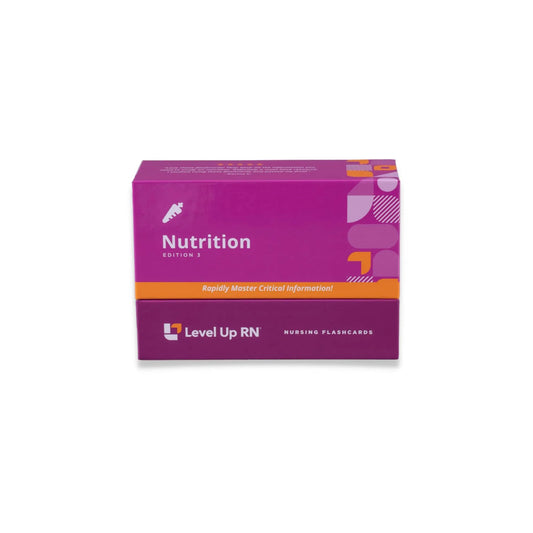Hi, I'm Cathy with Level Up RN. In this video, I'm going to continue my coverage of topics from our Level Up RN nutrition flashcard deck. Specifically, I'll be talking about nutritional guidance for irritable bowel syndrome, or IBS, as well as inflammatory bowel disease, or IBD. At the end of the video, I'm going to give you guys a quiz to test your understanding of some of the key points I'll be covering in the video. So definitely stay tuned for that. And if you have our flashcards, go ahead and pull out your flashcard on IBS and IBD so you can follow along with me.
Irritable bowel syndrome or IBS is a disorder that causes abdominal pain or discomfort, bloating, and a change in bowel habits that cannot be explained by any other underlying cause. In terms of nutritional guidance, individuals with IBS are often advised to keep a food symptom journal in order to identify specific foods that trigger symptoms so that those foods can be avoided. And for some people, avoiding things such as milk, alcohol, caffeine, and/or gluten may help improve symptoms. The provider may recommend other nutritional interventions as well, such as increasing fiber intake or consuming a low FODMAP diet. A low FODMAP diet restricts certain carbohydrates that are hard to digest to see if symptoms improve. And then in terms of lifestyle guidance, increasing physical activity, reducing stress, and getting enough sleep can help improve symptoms.
Next, let's talk about inflammatory bowel disease, or IBD, which includes Crohn's disease and ulcerative colitis. These disorders cause chronic inflammation of the digestive tract, leading to symptoms such as severe diarrhea, abdominal pain, and weight loss just to name a few. In terms of nutritional guidance, individuals with IBD are advised to consume a nutrient-dense diet that is high in calories and high in protein but low in fiber. Patients are also advised to avoid foods that trigger symptoms such as high-fat foods, lactose-containing foods, sugary foods and beverages, as well as alcohol and caffeine. In addition, eating smaller, more frequent meals, as opposed to fewer, larger meals, can help improve symptoms. And then for complications associated with IBD, such as severe inflammation, enteral and/or parenteral nutrition may be necessary.
All right, it's quiz time. Are you guys ready?
Question number 1, why should patients with IBS keep a food symptom journal?
The answer is it helps to identify specific foods that trigger symptoms so that those foods can be avoided.
Question number 2, individuals with IBD are advised to increase their intake of fiber, true or false?
The answer is false. IBD causes severe diarrhea, so increasing fiber intake will make that worse.
Question number 3, milk, caffeine, and alcohol should be avoided with both IBS and IBD, true or false?
The answer is true.
All right. That's it for this video. I hope it was helpful. Take care and good luck with studying.
[BLOOPERS]
Restricts certain carbohydrates that are hard to digest-- enteral and/or parenteral [inaudible].


